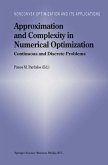Partition functions arise in combinatorics and related problems of statistical physics as they encode in a succinct way the combinatorial structure of complicated systems. The main focus of the book is on efficient ways to compute (approximate) various partition functions, such as permanents, hafnians and their higher-dimensional versions, graph and hypergraph matching polynomials, the independence polynomial of a graph and partition functions enumerating 0-1 and integer points in polyhedra, which allows one to make algorithmic advances in otherwise intractable problems.
The book unifies various, often quite recent, results scattered in the literature, concentrating on the three main approaches: scaling, interpolation and correlation decay. The prerequisites include moderate amounts of real and complex analysis and linear algebra, making the book accessible to advanced math and physics undergraduates.
The book unifies various, often quite recent, results scattered in the literature, concentrating on the three main approaches: scaling, interpolation and correlation decay. The prerequisites include moderate amounts of real and complex analysis and linear algebra, making the book accessible to advanced math and physics undergraduates.
"The book is aimed at graduate students and researchers in theoretical computer science, combinatorics and statistical physics. ... The author has the ability to make complicated proofs very accessible while not sacrificing any mathematical rigour, making it a pleasure to read. ... The book also moves from the particular to the general ... . An advantage of this is that it makes it easier to understand the key ideas." (Guus Regts, Mathematical Reviews, August, 2018)








